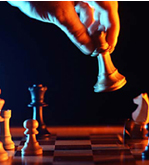 Like any sport, chess is not and will not be immune to the advent of human enhancement. And like other sports, there will be an awkward adjustment period as organizers learn to cope with the new reality. In the meantime, there will be a fine line that separates legitimate enhancement from outright cheating.
Like any sport, chess is not and will not be immune to the advent of human enhancement. And like other sports, there will be an awkward adjustment period as organizers learn to cope with the new reality. In the meantime, there will be a fine line that separates legitimate enhancement from outright cheating.Take the recent 10-year suspension of Umakant Sharma who was caught with a blue tooth device hidden in his cap when random checking was conducted during the seventh round of the Air Marshal Subroto Mukerjee Memorial All India Open FIDE Rating Chess Tournament. Sharma, who was playing black, was the top seed with an ELO of 2384.
Ouch. In my opinion a 10-year suspension is rather harsh. It would appear that an example is being made; chess organizers are implementing a zero tolerance policy when it comes to players cheating with computers.
Indeed, computers have so revolutionized the game that it is a hard temptation to avoid. But while the use of computers to assist in chess is fairly easy to detect, more physically intrinsic advantages, such as cognitive enhancement, will be harder to both assess and enforce.
What will happen when the first genetically modified competitors emerge? Will there be a stratification of competitions, ones featuring unaugmented players and ones featuring those with genetic mods? Thinking more philosophically, what is the qualitative difference between an unmodified player who was born with a genetic advantage versus a player who had that advantage given to them via assistive reprotech? Or is it the work ethic and committment to the game that is being rewarded? A strong case can be made that the furtherance of and excellence in sport is in the outcome, and not what goes on in the background (so long as the rules are being followed and the 'spirit' of the game is maintained).
In the case of chess, as I have already argued, if humans want to continue to have meaningful involvement in chess as it is played at the highest level, they will have no choice but to use computers as assistive devices and/or augment their brains so that they can keep up with supercomputers.
When I was following the recent Kramnk-Deep Fritz tournament, the play-by-play commentator (a grandmaster level player) noted how he hoped a strong cup of coffee would help him better analyze the match. This was a very telling moment for me. Chess players are already quite aware of which stimulants can assist in their play. As the Sharma incident has shown, they will undoubtedly seek out any opportunity to get an edge.
More to the point, however, as the human species changes so too must our competitive activities. The rules of sport, whether these sports require mental or physical skill, will have to bend in the face of the biotech wind.

No comments:
Post a Comment